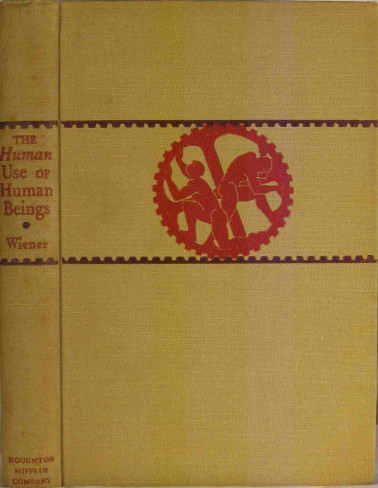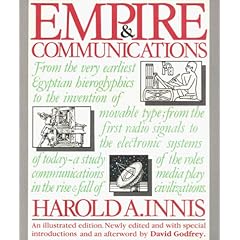Norbert Wiener: The Human Use of Human Beings: Cybernetics and Society (1950–) [EN, FR, BR-PT, RU, ES, SC, IT, GR]
Filed under book | Tags: · computing, cybernetics, entropy, machine, society, theory of communication

“Founder of the science of cybernetics—the study of the relationship between computers and the human nervous system—Wiener was widely misunderstood as one who advocated the automation of human life. As this book reveals, his vision was much more complex and interesting. He hoped that machines would release people from relentless and repetitive drudgery in order to achieve more creative pursuits. At the same time he realized the danger of dehumanizing and displacement. His book examines the implications of cybernetics for education, law, language, science, technology, as he anticipates the enormous impact—in effect, a third industrial revolution—that the computer has had on our lives.”
Publisher Houghton Mifflin, Boston, 1950
241 pages
New edition
With an Introduction by Steve J. Heims
Published by Free Association Books, London, 1989
ISBN 1853430757
xxx+199 pages
Wikipedia (EN)
The Human Use of Human Beings: Cybernetics and Society (English, 1950, added on 2021-4-8)
The Human Use of Human Beings: Cybernetics and Society (English, 1950/1989, updated on 2021-4-8)
Cybernétique et société: l’usage humain des êtres humains (French, 1952/2014, EPUB, added on 2021-4-8)
Cibernética e sociedade: o uso humano de seres humanos (BR-Portuguese, trans. José Paulo Paes, 2nd ed., 1954/1968, added on 2013-12-12)
Kibernetika i obshchestvo (Russian, trans. E.G. Panfilov, 1958, DJVU, added on 2021-4-8)
Cybernética y sociedad (Spanish, trans. José Novo Cerro, 1958, added on 2021-4-8)
Kibernetika i društvo: ljudska upotreba ljudskih bića (Serbo-Croatian, trans. Ljubomir Radanović, 1964, added on 2021-4-8)
Introduzione alla cibernetica: l’uso umano degli esseri umani (Italian, trans. Dario Persiani, 1966, added on 2021-4-8)
Kyvernētikē kai koinōnia: ē anthrōpinē chrēsimopoiēsē tōn anthrōpinōn ontōn (Greek, trans. Giannē Iōannidē, 1970, DJVU, added on 2021-4-8)
Heinz von Foerster: Understanding Understanding. Essays on Cybernetics and Cognition (2003)
Filed under book | Tags: · cognition, computation, cybernetics, knowledge, theory of communication

“In these essays Heinz von Foerster discusses some of the fundamental principles that govern how we know the world and how we process the information from which we derive that knowledge. Included are path- breaking articles concerning the principles of computation in neural nets (1967), the definition of self-organizing systems (1960), the nature of cognition (1970), as well as recent expansions on these themes (e.g. “How recursive is communication,” 1993). Working with Norbert Wiener, Warren McCullough, and others in the 1960s and 1970s, von Foerster was one of the founders of the science of cybernetics, which has had profound effects both on modern systems theory and on the philosophy of cognition. At the Biological Computer Laboratory at the University of Illinois he produced the first parallel computers and contributed to many other developments in the theory of computation and cognition.”
Publisher Springer, 2003
ISBN 0387953922, 9780387953922
xii+362 pages
PDF (updated on 2020-4-17)
Comment (0)Harold A. Innis: Empire & Communications (1950/1986)
Filed under book | Tags: · communication technology, history of communications, media, media theory, theory of communication

It’s been said that without Harold A. Innis there could have been no Marshall McLuhan. Empire and Communications is one of Innis’s most important contributions to the debate about how media influence the development of consciousness and societies. In this seminal text, he traces humanity’s movement from the oral tradition of preliterate cultures to the electronic media of recent times. Along the way, he presents his own influential concepts of oral communication, time and space bias, and monopolies of knowledge.
Keywords and phrases
Babylonia, monopoly of knowledge, papyrus, Hittites, Egypt, Byzantine empire, Persian empire, Sumerian, oral tradition, Hyksos, Dionysus, Assyrian, Kassites, Orphism, monasticism, Roman law, Mitanni, Werner Jaeger, Aramaic, Athens
Edited by Dave Godfrey
Publisher Press Porcépic, 1986
ISBN 0888782446, 9780888782441
Length 184 pages
More info (wikipedia)
More info (google books)

